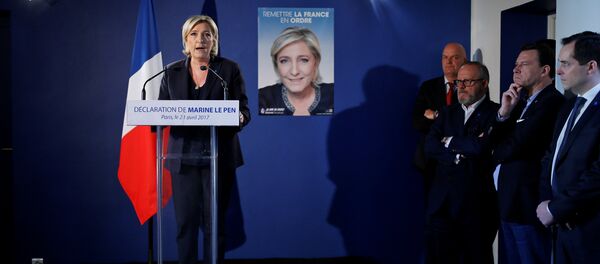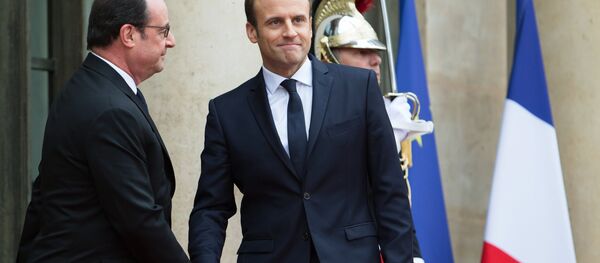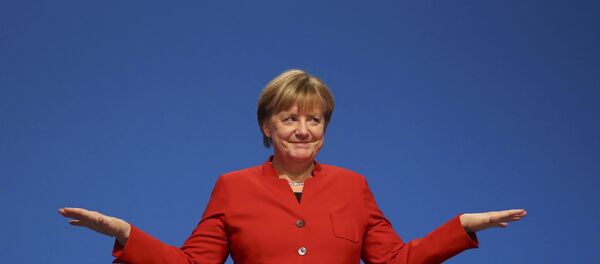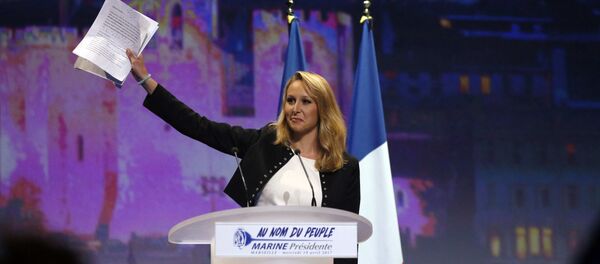MOSCOW (Sputnik) — The right-wing National Front (FN) stands to make huge gains in the French National Assembly after the June legislative election if it manages to capitalize on the current anti-globalism trend by forming a new political group of "patriots versus globalists" alongside the right-wing politicians within the center-right The Republicans party (LR), experts told Sputnik.
The two-round French legislative elections are scheduled to take place on June 11 and June 18. The victory of centrist Emmanuel Macron over right-wing FN candidate Marine Le Pen in the presidential election created a new political reality, in which the future of France's mainstream parties of the left and right will depend on the outcome of the legislative vote.
Based on the survey, 26 percent would vote for La Republique En Marche! and its Democratic Movement (MoDem) ally, 20 percent each would go to LR and their center-right The Union of Democrats and Independents party (UDI) ally, and the National Front, 14 percent would go to Jean-Luc Melenchon’s France Insoumise, and 7 percent to the Socialists and its Radical Party of the Left (PRG) ally.
Expectations Versus Reality
The survey’s figures reflect the relative popularity of competing political groups ahead of the first round but give a little insight into which will win parliamentary seats in the second round, as the contenders from traditionally left and right parties are likely to agree on pacts to prevent the FN’s candidates from winning. Therefore, while the predicted gain of 120 out of 577 total seats for the National Front is a significant improvement compared to two FN lawmakers currently seated in the outgoing parliament, the actuality of it occurring is quite unrealistic.
"Now, it looks like the FN will do well to get 40, maybe 50 seats in the National Assembly. To achieve that, the FN needs to reach out to fellow supporters to make up some sort of nationalist/republican bloc. Le Pen will hope to split The Republicans' right wing by offering local deals in constituencies where 'her' electorate could help a right-wing candidate to take the seat," Paul Smith, a commentator on French politics and associate professor of French and Francophone studies at the University of Nottingham, told Sputnik.
Meanwhile, the leadership of The Republicans urged party members not to defect to Macron's camp as the elections approached.
"Leaving your party is the best way of getting the door slammed in your face," Francois Baroin, the head of The Republicans' parliamentary election team, told reporters on Wednesday.
Smith also emphasized that in order for the National Front to "win over the pro-nationalist, right-wing electorate, which supports Francois Fillon," the FN needs to make use of a new political paradigm, defined by a confrontation between globalists and patriots, which emerged to replace the traditional class-based left-right division.
"The number of votes garnered by Marie Le Pen is quite impressive, despite the loss," Saviano told Sputnik adding that victories in both the national and local elections in 2015 should boost the FN’s chances in June.
In 2015 election for regional presidencies, the FN shook France by topping the national vote tally in the first round. However, in the end, the FN candidates were defeated in the second round only after the left pulled out and urged its supporters to vote for center-right candidates in a last-ditch effort to block the FN from gaining power.
One of the National Front's biggest victories was celebrated when Marine Le Pen won 34 percent of the vote in the second round of this year's presidential election, after not making it through the first round in the 2012 election.
Will FN Change Its Game?
This desire to change the party was evident during her presidential campaign, during which Le Pen tried to avoid using the party name in her brochures, posters and speeches swapping the FN’s flame logo for a blue rose and the slogan "Choose France."
Le Pen, who succeeded her 88-year-old father, Jean-Marie Le Pen, as the movement’s leader in 2011, worked hard to distance her party from politics linked to antisemitism and xenophobia, with which the party had been associated under Jean-Marie Le Pen.
"Le Pen might, actually, change the party name, because it is still the case for some voters that 'le Front National' is what you might call a toxic brand," Paul Smith said, adding that "Le Pen might choose a 'movement' name — Choisir la France — or a party name — le Parti National Républicain, but the former sort of name seems more likely at this point."
The expert agreed that she, for the most part, succeeded in efforts to modernize the party’s image after taking the FN to its highest level of support since the Second World War and nearly doubling the share of votes her father had managed to gain in the 2002 presidential election. Jean-Marie Le Pen ultimately lost the election to his rival Jacques Chirac, who received a staggering 82.2 percent of the vote.
But Le Pen's daughter never strayed far from the FN’s stock themes of immigration and Islamic fundamentalism, both of which have become hot-button issues due to the string of jihadist attacks in France that have killed more than 230 people since 2015.
Nino Saviano attributed Le Pen's election success to her timely focus on the anti-migration and anti-EU platforms amid an unprecedented migrant crisis and the growing threat of Islamic radicalization, along with her long-term efforts to improve the image of her party.
"The number of votes garnered by Marine Le Pen is quite impressive, despite the loss. But the gulf between the level of support she has secured and what is needed to become truly competitive is also quite impressive. There is a need for improving the image of the party as well as re-evaluate its strategy both in terms of messaging and policy positions. The National Front must broaden its appeal or it will just remain an opposition party relegated to the fringes of the political spectrum, regardless of how strong its base may be," Saviano added.
The FN currently has two lawmakers in the outgoing National Assembly: Marion Marechal-Le Pen, Marine Le Pen's 27-year-old niece, who announced that she was quitting politics ahead of the legislative vote, and former lawyer Gilbert Collard. Marine Le Pen does not hold a seat in France's National Assembly but does have a mandate of a member of the European Parliament in Brussels.
However, while expectations are high among FN’s supporters, experts note that France's two-round electoral system may seriously undermine party’s chances of winning the legislative majority in the parliament as fir the presidency in 2017.
The only time when the National Front had 35 lawmakers in the French National Assembly under a system of proportional representation was in 1986. This system was replaced shortly thereafter by a two-round system, allowing the far-right party to win only a single seat in the next legislative election.
Macron's Uphill Battle in June Vote
"The legislative elections are a much bigger test for Macron. Not only there are complex challenges that he will need to overcome organizationally, but ideologically his movement will find it hard to put forth candidates that will match Macron’s own personal and political appeal," Smith said, noting that established traditional French parties such as LR or the Socialist party may be seen as better alternatives in serving the needs of local communities.
"Also, the 'all politics is local' mantra is particularly true in legislative elections," he added.
On Thursday, La Republique En Marche! Secretary General Richard Ferrand announced 428 parliamentary candidates in a bid to gain a majority in the parliament, which should allow Macron to lead effectively for the next five years.
Ferrand stressed that the party upheld its promise to have a balance of both male and female candidates, naming 214 candidates of each sex. Additionally, the promise to have half of the candidates come from civil society was also fulfilled.
Nino Saviano believes that the president still has a chance at winning a majority since, according to established French rules, supporters of the loosing candidate or the party must abstain from voting in the legislative election, something which allows the winner to secure a majority.
"I think there is every chance Macron will get a majority. Since the new system was introduced in France in 2002, we have seen a significant drop in participation between presidential and general elections: generally from 80% to 57-60%. As a rule, supporters of the losing candidate(s) stay at home, leaving the winner to secure a majority. So Macron's opponents will need to mobilize their troops just as much as he will need to mobilize his," Saviano said.
An Elabe poll for BFM TV found after the presidential run-off that 52 percent of those polled wanted La Republique En Marche! to get a majority in parliament while 47 percent wanted opposition lawmakers to hold a majority.








